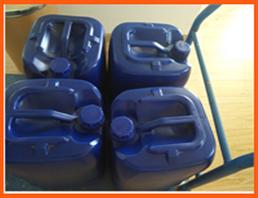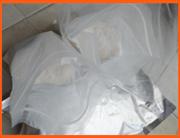Certificate of Analysis
|
Test items
|
Standard
|
Results
|
|
Relative Density (20/20°C)
|
0.888~0.908
|
0.902
|
|
Refractive Index (20°C)
|
1.4560~1.4660
|
1.4573
|
|
Optical Rotation (20°C)
|
-17°~-24°
|
-18.55°
|
|
Menthone
|
14.0%-32%
|
17.67%
|
|
Acid Value (mg.KOH/g):
|
8~25 (3%~9%)
|
23%
|
|
L-Menthol
|
≥30%
|
32.41%
|
|
Total Menthol Content (TMC)
|
≥50%
|
53.45%
|
Function
1 Peppermint Essential Oil is widely credited with being a digestive aid.
2 Peppermint leaves contain menthol, which is a proven aid to digestion.
3 The familiar aroma of Mentha piperita is known for both its warming and cooling properties.
4 Friendly to the sinuses, peppermint is also useful to the muscular system, especially for women during monthly cycles or menopause.
5 Properties include being refreshing, a mental stimulant and energizing.
6 It relieves bad breath and is a good nerve tonic that helps with mental fatigue and nervous stress.
Application
Indigestion: Peppermint oil is very helpful in digestion. People often put a few drops of peppermint oil in a glass of water and drink it after their meal for its beneficial digestive properties. It is carminative and therefore helps in removing excess gas. Peppermint oil is also a good tonic for those who have a low appetite, and it helps treating motion sickness, nausea and upset stomachs. Preliminary research has proved that peppermint oil, when combined with caraway oil can be used for treating heartburn.
Dental care: Peppermint oil, due to its antiseptic properties, is very useful in dental care. It also eliminates bad breath and helps teeth and gums fight off hazardous germs. Unsurprisingly, these attributes mean that peppermint oil is added to numerous toothpastes, and it is also been shown to be useful in the treatment of toothaches.
Respiratory problems: Menthol, which is abundantly present in peppermint oil, helps to clear the respiratory tract. It is also an effective expectorant and therefore provides instantaneous, though temporary, relief for numerous respiratory problems including nasal congestion, sinusitis, asthma, bronchitis, cold and cough. As a result, it is used in numerous cold rubs and balms. When these cold rubs are applied to the chest, they can quickly remove nasal and respiratory congestion.
Nausea and headache: Peppermint oil is a good home remedy for nausea and headaches. To quickly alleviate the pain of a headache, simply apply peppermint oil in a diluted form directly on the forehead.
Stress: Like most other essential oils, peppermint is able to provide relief from stress, depression and mental exhaustion due to its refreshing nature. It is also effective against anxiety and restlessness.
Irritable bowel syndrome: The muscle relaxant property of peppermint oil has been found to ease irritable bowel syndrome. This has been validated through preliminary scientific research, although the exact mechanism is still unknown.
Antispasmodic: Peppermint oil is very effective for gastroscopy, colonoscopy and during double-contrast barium enema, where it is applied intraluminally. Further benefits of peppermint oil that might stem from its antispasmodic properties are being studied.
Urinary tract infection: Peppermint oil can be used to treat urinary tract infections (UTI). Although it is traditionally used, formal scientific research is still underway to understand the details of this specific attribute.
Pain relief: Peppermint oil can be used externally in order to provide relief from pain. It is believed that the presence of calcium antagonism in peppermint oil helps remove pain from affected areas. It is also cooling in nature and is subsequently used to help reduce fever.
Immune system: Peppermint oil can increase a person's immunity to various diseases and is commonly employed by those people with weak immune systems or who seem to frequently suffer from illness.
Blood circulation: The stimulating effects of peppermint oil have been shown to increase blood circulation.
Hair care: Peppermint oil is very useful for hair care as it gives a cooling effect to the head, while removing dandruff and lice.
Skin care: Peppermint oil contains menthol, which is good for the skin because it creates a cooling sensation. Furthermore, it nourishes dull skin and improves the texture of oily or greasy skin.
It is also believed that peppermint oil is useful in the treatment of cancer and tuberculosis, although more research needs to be done in these areas.
Peppermint blends well with various other essential oils including eucalyptus, rosemary, lemon, marjoram, so many aromatherapists and herbalists commonly use peppermint oil in their medicinal or aromatic combinations.


 China
China


